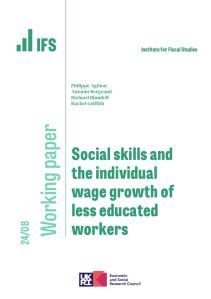In this paper we use high quality data from two developing countries, Ethiopia and Peru, to estimate the production functions of human capital from age 1 to age 15. We characterize the nature of persistence and dynamic complementarities between two components of human capital: health and cognition. We also explore the implications of different functional form assumptions for the production functions. We find that more able and higher income parents invest more, particularly at younger ages when investments have the greatest impacts. These differences in investments by parental income lead to large gaps in inequality by age 8 that persist through age 15.
Authors

CPP Co-Director
Orazio is an International Research Fellow at the IFS, a Professor at Yale and a Research Associate at the National Bureau of Economic Research.

Research Fellow Yale University
Costas is a Research Fellow of the IFS and a Professor of Economics at Yale University and a Visiting Professor at University College London.

Emily Nix

Research Associate University of Essex
Francesca is an IFS Research Associate, a Research Fellow in the Research Department of the Bank of Italy and also a Research Affiliate at IZA.
Journal article details
- DOI
- 10.1016/j.red.2017.02.002
- Publisher
- Elsevier
- JEL
- J24, I15
- Issue
- Volume 25, April 2017, pages 234-259
Suggested citation
Attanasio, O et al. (2017). 'Human capital growth and poverty: Evidence from Ethiopia and Peru' 25(2017), pp.234–259.
More from IFS
Understand this issue

Sure Start achieved its aims, then we threw it away
15 April 2024

Retirement is not always a choice that workers can afford to make
6 November 2023

If you can’t see it, you can’t be it: role models influence female junior doctors’ choice of medical specialty
24 April 2024
Policy analysis

Living standards since the last election
21 March 2024

The short- and medium-term impacts of Sure Start on educational outcomes
9 April 2024

Sure Start greatly improved disadvantaged children’s GCSE results
9 April 2024
Academic research

Labour market inequality and the changing life cycle profile of male and female wages
15 April 2024

Social skills and the individual wage growth of less educated workers
27 March 2024

Police infrastructure, police performance, and crime: Evidence from austerity cuts
24 April 2024